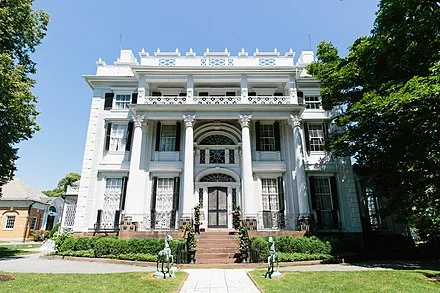Direct reparations for slavery won't work
Linden Place, in Bristol, R.I., built in 1810 for the Rhode Island slave trader George DeWolf
From Robert Whitcomb’s “Digital Diary,’’ in GoLocal24.com
Some Democratic candidates -- intent on political suicide? -- continue to promote financial reparations for the slavery that ancestors of African-Americans endured. But this would be administratively impossible and unfair: No one alive in America has owned slaves and most African-Americans have some white blood. Do we believe in blood guilt for what some our distant ancestors may have done?
Apportioning blame for American slavery is sure tricky. The African slaves who were brought to North America (who were a small percentage of the slaves brought to the Caribbean and Central and South America) had been captured and sold to European slave traders on the West African coast by Africans. (Slavery continues in parts of Africa to this day.)
Thomas Sowell, the conservative economist, and an African-American, succinctly noted:
"The region of West Africa … was one of the great slave-trading regions of the continent - before, during, and after the white man arrived. It was the Africans who enslaved their fellow Africans, selling some of these slaves to Europeans or to Arabs and keeping others for themselves. Even at the peak of the Atlantic slave trade, Africans retained more slaves for themselves than they sent to the Western Hemisphere. Arabs were the leading slave raiders in East Africa, ranging over an area larger than all of Europe."
Most African-Americans still suffer, in varying degrees, from the socio-economic effects of slavery and segregation. The fairest and most effective way to deal with that is through public policies that help address income and education inequality.
